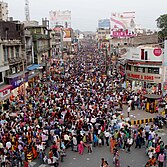**1. Definition and Evolution of Society:**
– The term society refers to a large group of people in an ordered community.
– It dates back to at least 1513 and comes from the 12th-century French word société.
– Societies vary based on level of technology and type of economic activity.
– Human society features high degrees of cooperation.
– Some biologists categorize humans as eusocial, placing them with ants in terms of sociability.
– Theorists view society as socially constructed, with different paradigms like functionalism and conflict theory.
**2. Non-Western Perspectives on Society:**
– Some non-Western thinkers, like Ibn Khaldun and José Rizal, took a systematic approach to understanding society.
– Khaldun conceptualized social structures as having nomadic and sedentary forms.
– Rizal theorized about colonial societies and exploitation.
– Malaysian sociologist Syed Farid al-Attas criticizes Western analysis of non-Western cultures.
– The sociologic emphasis on functionalism, conflict theory, and symbolic interactionism has been criticized as Eurocentric.
**3. Types of Societies:**
– Sociologists classify societies based on their level of technology into pre-industrial, industrial, and postindustrial.
– Subdivisions of these categories vary based on level of technology, communication, and economy.
– Sociologist Gerhard Lenski lists hunting and gathering, horticultural, agricultural, and industrial societies.
– Cultural evolution has a profound effect on patterns of community.
– Some cultures have evolved toward more complex forms of organization and control.
**4. Characteristics and Social Structures in Society:**
– Norms and roles dictate acceptable behavior in groups.
– Gender roles stem from cultural divisions based on sex differences.
– Ethnic groups share distinguishing attributes like traditions and language.
– Governments create laws and policies affecting their populations.
– Trade involves the voluntary exchange of goods and services.
**5. Conflict and Violence in Society:**
– War as organized conflict has been debated as a means to eliminate competitors.
– Evidence suggests warlike behavior became common about 10,000 years ago.
– Rates of violence vary widely according to societal norms.
– Changing social conditions are believed to have contributed to the appearance of war.
– Humans kill adults at a relatively high rate compared to other primates.
A society (/səˈsaɪəti/) is a group of individuals involved in persistent social interaction or a large social group sharing the same spatial or social territory, typically subject to the same political authority and dominant cultural expectations. Societies are characterized by patterns of relationships (social relations) between individuals who share a distinctive culture and institutions; a given society may be described as the sum total of such relationships among its constituent members.
Human social structures are complex and highly cooperative, featuring the specialization of labor via social roles. Societies construct roles and other patterns of behavior by deeming certain actions or concepts acceptable or unacceptable—these expectations around behavior within a given society are known as societal norms. So far as it is collaborative, a society can enable its members to benefit in ways that would otherwise be difficult on an individual basis.
Societies vary based on level of technology and type of economic activity. Larger societies with larger food surpluses often exhibit stratification or dominance patterns. Societies can have many different forms of government, various ways of understanding kinship, and different gender roles. Human behavior varies immensely between different societies; humans shape society, but society in turn shapes human beings.



